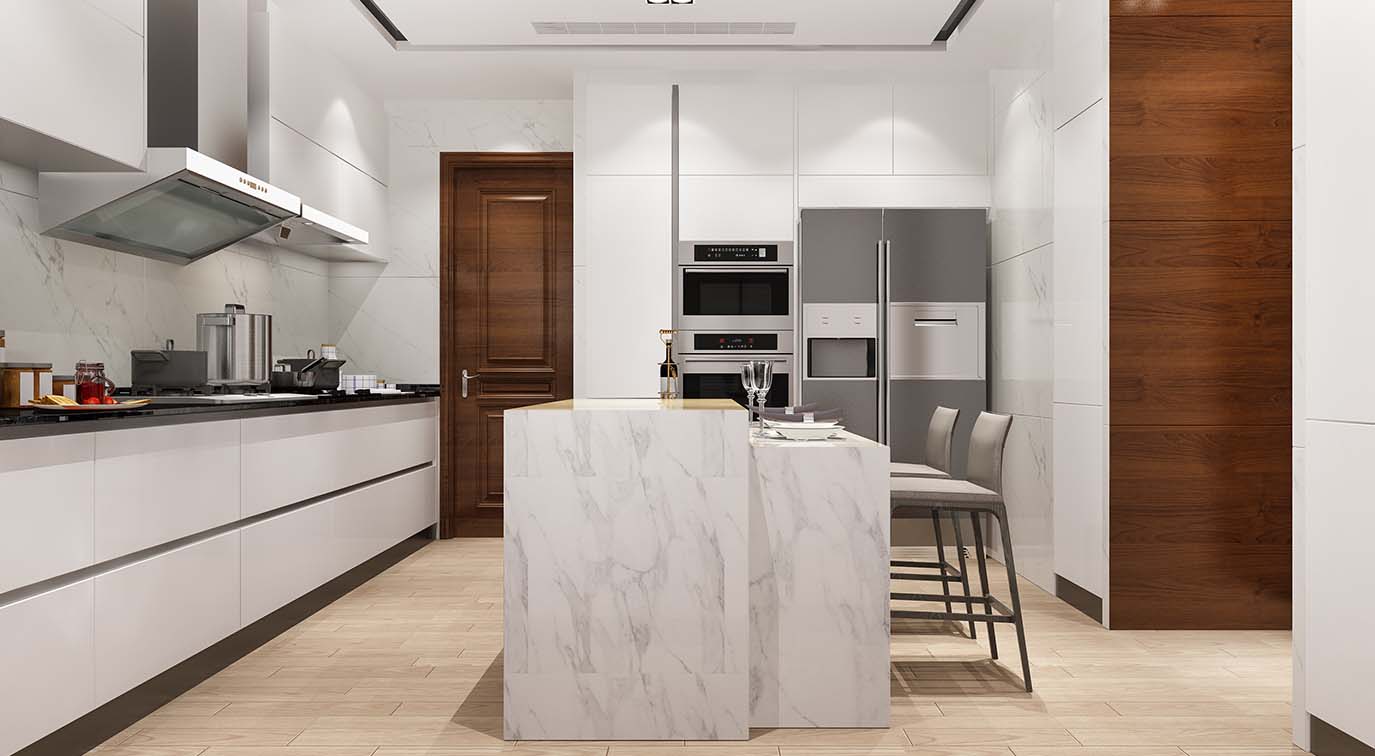The kitchen is the heart of every home, and in India, it is also one of the busiest spaces. From preparing daily meals to hosting family gatherings, the kitchen needs to be functional, durable, and stylish. That’s why modular kitchens have become so popular—they offer smart storage, convenience, and modern designs.
But one of the most important questions homeowners ask is:
Which material is best for a modular kitchen?
The right choice of material affects not only the look of your kitchen but also its strength, maintenance, and cost. In this guide, we will break down the different materials used in modular kitchens in India, their pros and cons, and how to choose the best one for your needs.
Factors to Consider Before Choosing Modular Kitchen Material
- Durability – Can it handle heat, moisture, and daily wear and tear?
- Maintenance – Is it easy to clean and resistant to stains?
- Cost – Does it fit your budget without compromising quality?
- Aesthetics – Does it match your home’s interior style?
- Space & Usage – Large families may need sturdier, low-maintenance materials.
Core Materials Used for Modular Kitchen Cabinets
- Plywood
One of the most common and reliable materials for modular kitchens in India.
Features:
- Made by pressing multiple layers of thin wood veneer.
- Stronger than MDF and particle board.
Pros:
- Durable and moisture-resistant (especially marine plywood).
- Can handle heavy loads like utensils and appliances.
- Termite-resistant if treated properly.
Cons:
- Slightly more expensive than particle board or MDF.
- Needs a good finish to look premium.
Best For: Cabinets, shutters, under-sink storage.
- MDF (Medium Density Fibreboard)
Engineered wood made from compressed wood fibres.
Pros:
- Smooth surface, great for painting and laminates.
- Affordable compared to plywood.
- Flexible for intricate designs (CNC cutting).
Cons:
- Not very moisture-resistant.
- Can sag under heavy weight.
Best For: Decorative panels, shutters in low-moisture zones.
- HDF (High Density Fibreboard)
Denser version of MDF with more strength.
Pros:
- Stronger and more durable than MDF.
- Smooth finish, great for glossy looks.
Cons:
- Still less water-resistant compared to plywood.
- Expensive compared to MDF.
Best For: Shutters, wall units.
- Particle Board
Made from compressed wood particles.
Pros:
- Budget-friendly.
- Lightweight and easy to install.
Cons:
- Not durable for heavy usage.
- Weak against moisture and termites.
Best For: Temporary or budget kitchens, rental flats.
- Solid Wood
Natural wood like teak, sheesham, or oak.
Pros:
- Premium look and long life.
- Strong and durable.
Cons:
- Expensive.
- Can warp due to humidity.
- Requires regular maintenance.
Best For: Luxury kitchens, classic-style homes.
Shutter & Finish Materials for Modular Kitchens
Apart from the core, the shutter material and finish give your kitchen its style.
- Laminate Finish
- Affordable, scratch-resistant, available in many colours.
- Glossy or matte options.
- Acrylic Finish
- High-gloss, premium look.
- Easy to clean, resistant to moisture.
- Costlier than laminates.
- Membrane Finish
- PVC foil pressed onto MDF.
- Smooth, durable, but may peel with heat exposure.
- Glass Shutters
- Transparent or frosted.
- Stylish, but requires frequent cleaning.
- Veneer Finish
- Natural wood finish.
- Premium look but needs polishing and care.
Countertop Materials for Modular Kitchens
- Granite
- Durable, heat-resistant, scratch-resistant.
- Most popular in India.
- Wide colour choices.
- Quartz
- Non-porous, stain-resistant.
- Available in uniform colours.
- Expensive compared to granite.
- Marble
- Elegant, classic look.
- Prone to stains and scratches.
- Solid Surface (Corian)
- Seamless joints, smooth finish.
- Limited heat resistance.
Backsplash Materials
- Tiles – Affordable, easy to clean.
- Glass – Sleek, modern look.
- Steel – Industrial-style, hygienic but prone to scratches.
Best Material Combinations for Modular Kitchens in India
- For Budget-Friendly Kitchens – Plywood + laminate finish + granite countertop.
- For Mid-Range Kitchens – Marine plywood + acrylic finish + quartz countertop.
- For Premium Kitchens – HDF or solid wood + veneer finish + quartz or solid surface countertop.
- For Heavy Usage (Indian Cooking) – Marine plywood cabinets + granite countertop + tiled backsplash.
Modular Kitchen Materials: Cost in India (Approx.)
| Material | Price Range (per sq. ft.) |
| Plywood | ₹100 – ₹200 |
| MDF | ₹80 – ₹150 |
| HDF | ₹150 – ₹250 |
| Particle Board | ₹60 – ₹120 |
| Laminate Finish | ₹800 – ₹1,200 |
| Acrylic Finish | ₹1,500 – ₹2,500 |
| Granite Countertop | ₹250 – ₹500 |
| Quartz Countertop | ₹400 – ₹1,000 |
(Prices vary by city and supplier)
Conclusion
There’s no single answer to which material is best for a modular kitchen—it depends on your budget, style, and daily usage.
- For durability & Indian cooking: Marine plywood with granite is the best choice.
- For modern, glossy looks: Acrylic on HDF or plywood with quartz.
- For budget options: MDF or particle board with laminate finish.
- For luxury kitchens: Solid wood with veneer finish and quartz countertops.
By choosing the right combination, you can design a kitchen that is stylish, functional, and long-lasting.
Looking to design your dream modular kitchen? At Better Home India, we specialise in creating customised, durable, and stylish modular kitchens using the best materials suited for Indian homes. From affordable solutions to premium designs, our experts guide you at every step.
👉 Visit Better Home India today and get a modular kitchen that matches your lifestyle, budget, and taste!












